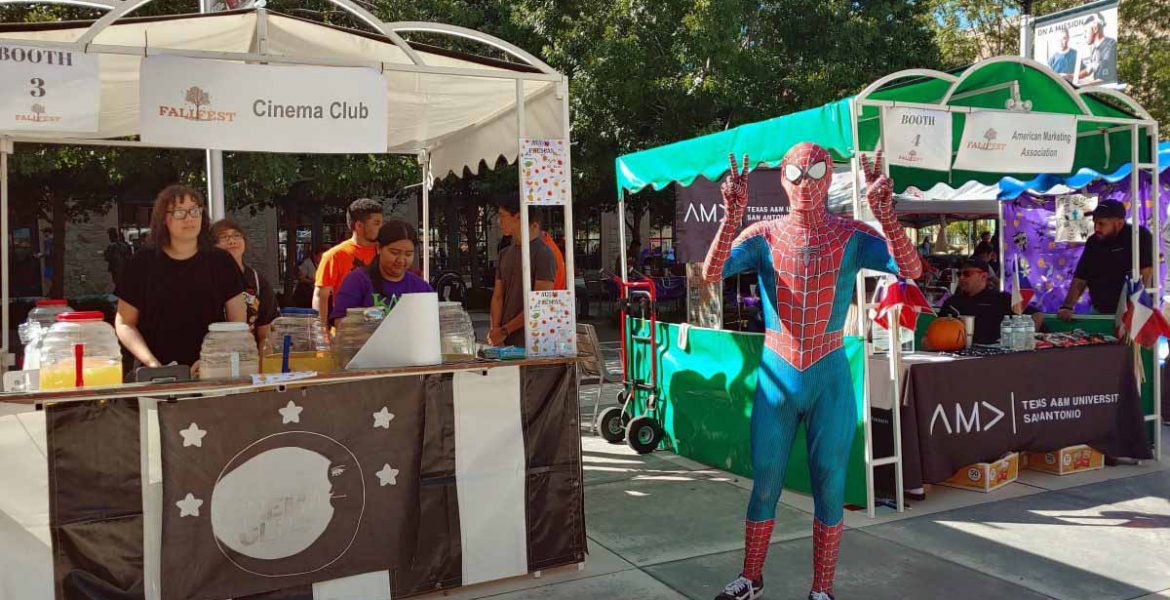The pandemic, February’s freeze and membership troubles have factored in reducing the number of clubs requesting to host on-campus fundraisers this semester.
Meanwhile, a university representative said student organizations have been slow to grab funding available from the university.
Organizations are struggling with membership recruitment and retention, which creates difficulty in staffing events and fundraisers.
“I think that when almost everything is virtual, there’s a lot more potential for disconnect,” said Delta Chi president Riley Robertson. “People have to be a lot more intentional about always interacting online, and some people just don’t really enjoy that or that’s not really their thing so we’ve seen a lot more disconnect from people that usually weren’t (disengaged.)”
Cristina Dominguez, assistant director of student involvement, said another factor is the low foot traffic on campus because of remote learning.
She said if an organization has the opportunity for an on-campus fundraiser, she doesn’t think “there’s enough people on campus to draw in a crowd to make a profit.”
Fundraising in a pandemic
After the pandemic hit, student organizations also had to adjust to new regulations when fundraising on campus, such as selling only pre-packaged food and following COVID-19 guidelines.
Dominguez said only two organizations have requested in-person fundraisers since August 2020.
The Chemistry Club requested an in-person event in February but because of delays caused by the winter storm, Dominguez did not receive approval for their fundraiser until the week it was meant to be held. Although the Office of the President gave them a four-week extension, the Chemistry Club decided not to have it.
The Mesquite emailed Chemistry Club president Carla Musquiz and vice president Alyssa Lopez March 8 and messaged them through JagSync, but did not hear back from them.
Robertson said his organization has taken a virtual approach to fundraising by hosting events such as a virtual yard sale and virtual bingo card game, using Instagram as a tool to promote and hold the event.
Dominguez said Festival de Cascarones and Fall Fest usually provide fundraising opportunities for organizations, but Fall Fest was canceled in 2020 and although Festival de Cascarones is scheduled to be held in June, Dominguez is unsure how the event will look.
Campus Life, which oversees student involvement and other offices, has been helping student organizations by creating fundraising opportunities.
As of fall 2020, members of student organizations can work as Ring Leaders on ring ceremony days. Each student who works the event gets $50 for their organization.
Robertson said Delta Chi has participated in the event to help fundraise.
As of spring 2021, organizations also have the opportunity to fundraise during Ring Days to sell items such as T-shirts, mugs and snacks provided by the university. Profits will be split up and distributed evenly to each organization that has members staff a table.
This semester’s ring ceremony was held April 9 and 10. Dominguez said seven organizations participated in the fundraising event and overall profits exceeded $4,000. A similar fundraiser is set to be held during graduation.
Dominguez said student organizations can also take advantage of profit-sharing opportunities. They can partner with a restaurant, such as Chick-Fil-A, Raising Cane’s or Chipotle, for one night where the restaurant shares a certain percentage from the meals of customers who mention the organization’s name that night.
Texas allows student organizations one tax-free fundraiser per month. However, since profit shares are taxed events, Dominguez said an organization could do these several times a month. They just have to make sure they have people show up.
Student organizations are responsible for reaching out to the restaurant to host the event. After setting up the event, they must then request the fundraiser on JagSync at least 14 days in advance.
Student organizations slow to request funding
Student organizations can also receive funding from the Office of Student Involvement.
However, Dominguez said out of the 20 recognized organizations this academic year, only one requested funding, even though there is more money available than ever.
“There is money,” Dominguez said. “They are not asking for it and they are not applying for it.”
The budget for student organizations fluctuates yearly based on her office’s budget. It depends on how much her office is given and the number of active organizations.
When a new student organization is established, they receive $300 in start-up funds, compared to past years where funds have ranged from $150 to $300, Dominguez said. These can be used to pay for things an organization might need such as tees and tablecloths.
After a year as an organization, it becomes recognized and the budget is bumped to $500 as an incentive to keep the organization involved. Returning organizations funds have ranged from $300-$350 in past years.
Dominguez said this is the highest budget yet in the five years she’s been with the university.
Any recognized organization is eligible to request funding after they’ve completed their requirements which are listed at the bottom of this story. Money must be used by May 11.
Dominguez hosts training for student organization leaders to help with recruitment, retention and fundraising but said the meetings have had low turnout. She said she has not received any concerns directly about the fundraising changes, but said she is sure there are some.
“I wish they would come to me with their questions or concerns because the way that I talked to you, is the way I would talk to them,” Dominguez told a reporter during an interview.
She said the low turnout in her fundraising meetings tells her that no one is interested in doing a fundraiser. The organizations that hosted on-campus fundraisers in the past are the ones that Dominguez said she thinks are most impacted.
Robertson said there have been fundraising concerns but they’ve been able to work through it themselves with the help of their advisers and their international headquarters.
“It’s just more difficult in general to come up with creative, virtual options that we think can be successful as compared to in-person things,” Robertson said. “I think it kind of makes us narrow down our possibilities.”
Requirements for an organization to fundraise, request funding
To fundraise, student organizations must complete three mandatory trainings — risk management, JagSync 2.0 training and Jaguar Student Organization training. They also must have an adviser, at least three members and a constitution.
Interest groups, or organizations who meet to discuss a topic of interest without completing these steps, are not allowed to fundraise.
To hold an event on campus, the organization must fill out the risk management form and request the event at least 15 days in advance. Last semester, a new requirement was implemented for events to be approved by the Office of the President; they prefer the request to be sent four weeks before.
The process to hold an on-campus event is as follows:
- The student organization submits the JagSync event request and fills out the risk management form.
- Dominguez submits a proposal to Dr. Mari Fuentes-Martin, vice president of student success and engagement.
- If approved by Fuentes-Martin, it is sent to the Office of the President to be reviewed for risk management.
- They reach back to Dominguez if they have any additional questions and Dominguez reaches out to the organization.
- If risk management is approved, then the event goes back to the Office of the President and Dominguez is informed if the event is approved.







